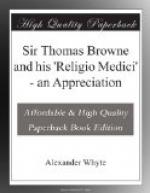experienced all that in acknowledging it to God’s
glory and to the unburdening of his own heart, so
richly loaded with God’s benefits. And,
how a man of Samuel Johnson’s insight, good sense,
and pious feeling could have so missed the mark in
this case, I cannot understand. All the more
that both the chapter so complained about, and the
whole book to which that chapter belongs, are full
of the same thankful, devout, and adoring sentiment.
‘The world that I regard,’ Sir Thomas
proceeds, ’is myself. Men that look upon
my outside, and who peruse only my conditions and
my fortunes, do err in my altitude. There is
surely a piece of divinity in us all; something that
was before the elements, and which owes no homage
unto the sun.’ And again, ’We carry
with us the wonders we seek without us. There
is all Africa and all its prodigies in us all.
We are that bold and adventurous piece of nature, which
he that studies wisely learns, in a compendium, what
others labour at in a divided piece and endless volume.’
And again, ’There is another way of God’s
providence full of meanders and labyrinths and obscure
methods: that serpentine and crooked line:
that cryptic and involved method of His providence
which I have ever admired. Surely there are in
every man’s life certain rubs, and doublings,
and wrenches, which, well examined, do prove the pure
hand of God. And to be true, and to speak out
my soul, when I survey the occurrences of my own life,
and call into account the finger of God, I can perceive
nothing but an abyss and a mass of mercies. And
those which others term crosses, and afflictions, and
judgments, and misfortunes, to me they both appear,
and in event have ever proved, the secret and dissembled
favours of His affection.’ And in the Christian
Morals: ’Annihilate not the mercies
of God by the oblivion of ingratitude. Make
not thy head a grave, but a repository of God’s
mercies. Register not only strange, but all merciful
occurrences. Let thy diaries stand thick with
dutiful mementoes and asterisks of acknowledgment.
And to be complete and to forget nothing, date not
His mercy from thy nativity: look beyond this
world, and before the era of Adam. And mark
well the winding ways of providence. For that
hand writes often by abbreviations, hieroglyphics,
and short characters, which, like the laconism on
Belshazzar’s wall, are not to be made out but
by a key from that Spirit that indited them.’
And yet again, ’To thoughtful observers the
whole world is one phylactery, and everything we see
an item of the wisdom, and power, and goodness of God.’
How any man, not to speak of one of the wisest and
best of men, such as Samuel Johnson was, could read
all that, and still stagger at Sir Thomas Browne holding
himself to be a living miracle of the power, and the
love, and the grace of God, passes my understanding.




